The silent and misunderstood mourning left behind by the death of an animal: ‘A kind of love that a human can’t give’
The pain caused by the death of an animal companion can be similar to losing someone close; sometimes even worse
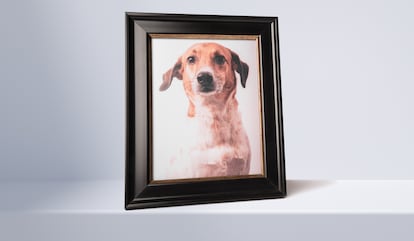
“My dog died yesterday. The pain is so deep that it scares me, because it covers everything. It is so deep that all I can do is sit and cry and think about loss, love for others or death.” Thus began a letter that a reader sent last week to EL PAÍS. More than 30,000 people liked the Instagram post that shared it; more than 400 comments expressed solidarity with the sender’s pain. The support and words of sympathy that these kinds of farewells receive are proof of the deep bond that animals and those who live with them share. Including celebrities: this past Tuesday, Paris Hilton also mourned the death of her 23-year-old dog, Harajuku Bitch, with an Instagram post that read “Rest easy, my sweet darling. Thank you for gracing my life with unconditional love.”
In a study carried out by the Spanish website Wamiz, which is specialized in companion animals, 90% of all cat and dog owners said that the pain they felt when they lost their pets was similar to losing someone close. Animals are also our loved ones, and their death moves us accordingly. In recent times, the perception of animals, especially pets, has undergone a distinct evolution; Enrique, a 45-year-old forestry technician, has witnessed it firsthand. “Ten years ago I told my boss that I couldn’t go to work because my dog was sick, and I didn’t want to leave him alone. He chuckled, thinking I was joking. When he passed away a few months ago I perceived a different response around me. Not having to make excuses to cover up something so important is a great relief.”
Hiding our feelings is, according to psychologist Beatriz Cuervo, the most harmful thing to do in a situation like that. “Downplaying what we feel doesn’t bring positive consequences. The pain of a loss is normal,” she explains. “Maybe in certain family, social or work contexts we are ashamed to admit that we are sad or that we feel that emptiness that comes with the absence of a companion animal. In that case, the appropriate thing would be to try to talk to someone who has been through a similar situation, even if they are not our best friend, but perhaps someone we meet when we take our dogs to the park.”

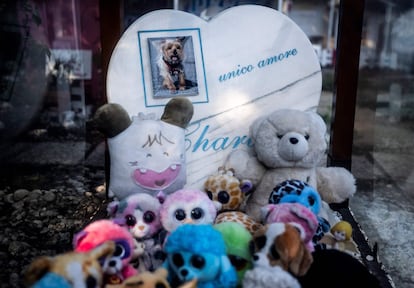
Laura Alberdi, the manager of a pet shop in Oviedo, Spain, has often been the recipient of those laments that some people cannot express in their own environment. “There is a woman in her seventies who still gets emotional when she tells us about the canary that her grandchildren gave her when she became a widow. At first Platanín felt like a nuisance, but then it became her most beloved company. People are surprised by the affection that animals give, no matter how small they are, but they easily recognize those who are good or mean to them. Its passing devastated her. She says that she misses it more than her husband. She says this quietly, as if she feared being heard.”
This is not an isolated case. “Here, we don’t know the names of most of the people, but we do know the names of every animal that comes through the door,” continues Alberdi. “That makes people feel understood when they tell us their stories.” And it is not just the customers: “One day a delivery man who was bringing some merchandise began to cry when he saw his cat’s favorite toy, because he had died the previous day. He took out his phone, showed us photos and spent a while there, telling us about his shenanigans.”
Saying goodbye
Marcelino’s end was very painful. It came after months of hospital admissions, ineffective medications, stress and a significant, but unavoidable, financial expense. After his death, Alba, a 42-year-old music teacher, decided that she would not go through it again, because “saying goodbye is too painful.” For eight years he shared her home. She had adopted him after someone left him at the door of a veterinary clinic, and he changed her life. “Contrary to what people think, cats are very affectionate. He met me at the door, was sociable with everyone who came to the house and knew my emotions better than I did. Statistically speaking, I lived alone, but I never felt that way: a cat turns four walls into a home.” More than a year has passed since he died, but she still has no intention of having any more pets. She cannot even look at his photos without breaking down.
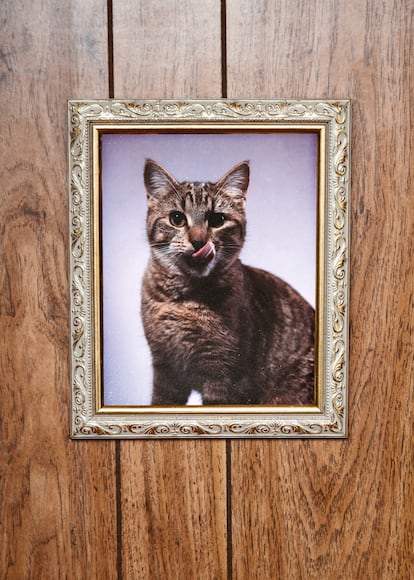
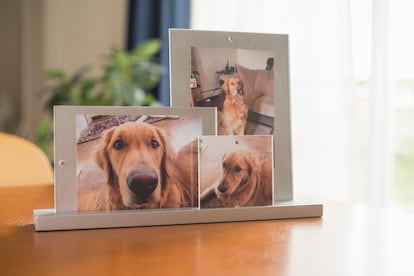
Sometimes the end is quick and unexpected. Marga, a 51-year-old civil servant, took her dog to the veterinary hospital thinking that she was only suffering from a persistent cold; it turned out to be a tumor mass. For a month they did all they could, but in the end a decision had to be made. Euthanasia is a daily reality for animals, a moment that can be very traumatic and in which the sensitivity of the professional plays a determining role. “Her vet made such a terrible moment somehow comforting, we said goodbye for an hour, I kissed her and she fell asleep peacefully in my arms. For two days I was in a sort of limbo; then I fell apart.”
Rita, who had been abandoned twice, came into her life at a key moment. “She helped me pull myself together.” They were barely able to be together for a couple of years, but despite the unfathomable pain, she admits that it was worth every day. “Of course it is like the death of an immediate family member, or worse,” she says. “You don’t share as much of your life with anyone as you do with them; their little face is the first thing you see when you wake up, they follow you to the bathroom, they snuggle up next to you on the sofa, they welcome you with the same joy no matter if you are returning from a week of vacation or if you just went to take out the garbage. They never judge you, they love you unconditionally, they don’t care if you are a millionaire or a homeless person. This kind of love does not exist in humans.”
When Rita passed away, Marga decided to take some time. She felt that bringing another dog home was like betraying her memory. However, one month later Frida was already there, because “life without a dog is incomplete.” The case of Frida, a ten-year-old mixed-breed dog, is an example of what might be called mourning in life: her owner had to say goodbye when entering a nursing home. “It’s a common case,” says Eva Rodriguez from the Adoptastur animal welfare association. “Sometimes it is unavoidable, because an older person is alone and animals aren’t allowed in nursing homes, but other times there are family members who take all the material things but get rid of the one that was that person’s only companion, as if it were a useless piece of junk.”
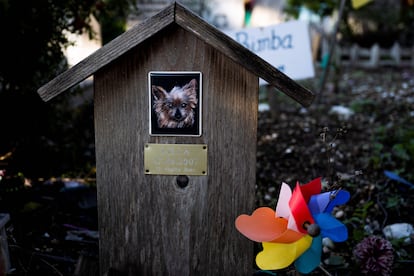
The effect is often devastating, both for the elderly people and for their animals. “Especially in the case of cats,” explains Rodríguez, “they are animals whose grief even leads them to let themselves die.” Animals, in their own way, also know what mourning is and suffer it both for their humans and for other animals with which they live.
Rodriguez herself knows that pain well: hundreds of animals have passed through her house, but only one has been her “dogpanion.” When Dana, a bull terrier that came into her life after years of mistreatment, died, she felt a pain that she had never imagined possible. “We went through a lot together; we went through five houses, several partners and even a pandemic. She was my companion no matter what.” Dana’s favorite spot, “where she felt safe during her last few months,” now has a large photograph of her. “Sometimes, to close wounds, in addition to talking about it, it can be useful to contemplate some kind of farewell ritual, a small tribute,” says Cuervo. “When we lose a loved one, we need those symbols that, beyond any beliefs, help us start a new stage and gradually get used to the idea of that absence.”
These farewells can be particularly painful for children, says Cuervo. “They may not understand what happened, or even blame themselves. It is important to give them explanations that are appropriate for their age, but without lying to them: forget about ‘gone to a better place,’ ‘went to heaven’ or ‘went to a farm.’ Children have the capacity to accept things, and the more accompanied and understood they feel, the better they will do it.”
When bringing a new pet home after the death of another, it is important to be aware that it is no substitute for the one that is gone, adds Rodríguez. “There are people who call the association to adopt an animal, and what they are looking for is a replica of the one that is no longer there. That is impossible and causes a lot of frustration, because no animal, no matter if it’s the same breed or even from the same litter, is the same as another.”
Sign up for our weekly newsletter to get more English-language news coverage from EL PAÍS USA Edition
Tu suscripción se está usando en otro dispositivo
¿Quieres añadir otro usuario a tu suscripción?
Si continúas leyendo en este dispositivo, no se podrá leer en el otro.
FlechaTu suscripción se está usando en otro dispositivo y solo puedes acceder a EL PAÍS desde un dispositivo a la vez.
Si quieres compartir tu cuenta, cambia tu suscripción a la modalidad Premium, así podrás añadir otro usuario. Cada uno accederá con su propia cuenta de email, lo que os permitirá personalizar vuestra experiencia en EL PAÍS.
¿Tienes una suscripción de empresa? Accede aquí para contratar más cuentas.
En el caso de no saber quién está usando tu cuenta, te recomendamos cambiar tu contraseña aquí.
Si decides continuar compartiendo tu cuenta, este mensaje se mostrará en tu dispositivo y en el de la otra persona que está usando tu cuenta de forma indefinida, afectando a tu experiencia de lectura. Puedes consultar aquí los términos y condiciones de la suscripción digital.









































